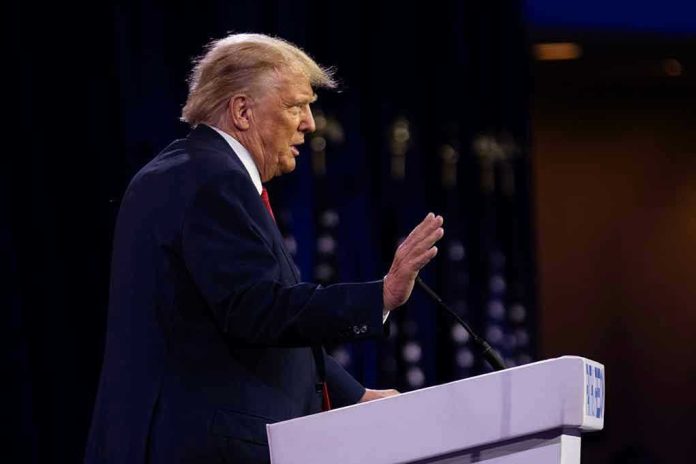
Trump’s foreign aid reversal is not just a budget maneuver—it’s a radical reimagining of U.S. global influence that threatens to upend decades of humanitarian progress, while critics claim the true winners are wealthy elites, not the world’s most vulnerable.
Story Snapshot
- Trump deploys historic pocket rescission, canceling $5 billion in foreign aid for the first time in fifty years.
- Administration claims cuts eliminate “woke, weaponized, and wasteful” spending, including climate, DEI, and LGBTQ initiatives.
- Critics argue wealthy interests benefit while programs for global health and democracy suffer.
- International organizations and vulnerable populations face immediate disruption and long-term risk.
Trump’s Pocket Rescission: A New Era for Foreign Aid
August 2025 marked a seismic shift in U.S. foreign policy when the Trump administration announced a “pocket rescission”—a rarely used legislative tool that slashed $5 billion from foreign aid budgets. This move, billed as eliminating wasteful and ideologically driven spending, effectively targeted programs supporting climate action, diversity, equity, and LGBTQ initiatives. The administration’s framing centered on “America First” priorities, aiming to redirect government focus away from international causes and toward domestic interests.
For many, this announcement was less about fiscal responsibility and more a political statement. The Impoundment Control Act had not witnessed such a maneuver in half a century, reinforcing the administration’s intent to rewrite the rules of U.S. engagement abroad. While supporters hailed the rescission as a long-overdue correction, experts in global health and development warned of grave consequences for millions who depend on American aid.
The Fallout for Aid Organizations and Vulnerable Populations
USAID, America’s flagship international development agency, became ground zero for the rescission’s impact. Reports surfaced that 86% of USAID’s awards were canceled early in 2025, threatening vital programs in health, education, and infrastructure across dozens of countries. Notably, $400 million earmarked for global health—much of it supporting PEPFAR, the widely respected initiative to combat HIV/AIDS—was proposed for rescission in June 2025. The disruption sent shockwaves through international organizations, which scrambled to fill funding gaps and maintain services for populations at risk.
The immediate effect was a freeze on development projects and humanitarian assistance, especially in regions where American aid underpinned local economies and critical services. Health workers, educators, and civic leaders warned that the sudden withdrawal of resources could undo years of progress, leaving communities exposed to disease, poverty, and instability. The Center for American Progress and the Kaiser Family Foundation both published analyses detailing how these abrupt cuts risked undermining U.S. influence and credibility on the global stage.
Who Benefits? Scrutiny of the “Needy Billionaires” Narrative
Critics of the rescission were quick to point out a paradox: while the administration claimed to be targeting “woke” and wasteful spending, the actual beneficiaries of the aid cuts appeared to be wealthy stakeholders with interests in international finance and investment. Allegations swirled that billionaires, particularly those holding debt in countries like Argentina, stood to gain from the reallocation or cancellation of funds that previously supported broader development goals. However, no direct evidence emerged to substantiate claims that the wealthy were the primary winners, and the administration denied any preferential treatment.
Social media amplified the debate, with voices from both sides arguing over the true impact. While some praised the move as a necessary reset of American priorities, others lamented the erosion of U.S. soft power and humanitarian leadership. The accusation that “needy billionaires” profited at the expense of starving children and struggling communities became a rallying cry for those opposed to the policy shift, but the facts remain contested and the long-term implications uncertain.
Ripple Effects: Global Health, Politics, and American Influence
The broader ramifications of the rescission extend far beyond budget lines. Economically, the loss of funding jeopardizes development projects and local businesses that rely on U.S. contracts and grants. Socially, the cuts threaten to unravel support for health, education, and equality initiatives, with the poorest communities bearing the brunt. Politically, the move risks diminishing America’s reputation as a global leader in promoting stability and democracy, as allies and adversaries alike question the reliability of U.S. commitments.
Industry experts caution that the long-term weakening of health infrastructure and democratic institutions could foster instability, opening the door for rival powers to fill the void. Advocacy groups continue to press Congress to reject the rescission package, but the administration’s narrative of fiscal conservatism and ideological realignment remains potent. As the debate rages, the fate of billions in aid—and the millions who depend on it—hangs in the balance, offering a stark reminder of the enduring tension between national interests and global responsibilities.
Sources:
White House: Historic pocket rescission package eliminates woke, weaponized, and wasteful spending
Kaiser Family Foundation: The Trump administration’s foreign aid review status of PEPFAR




